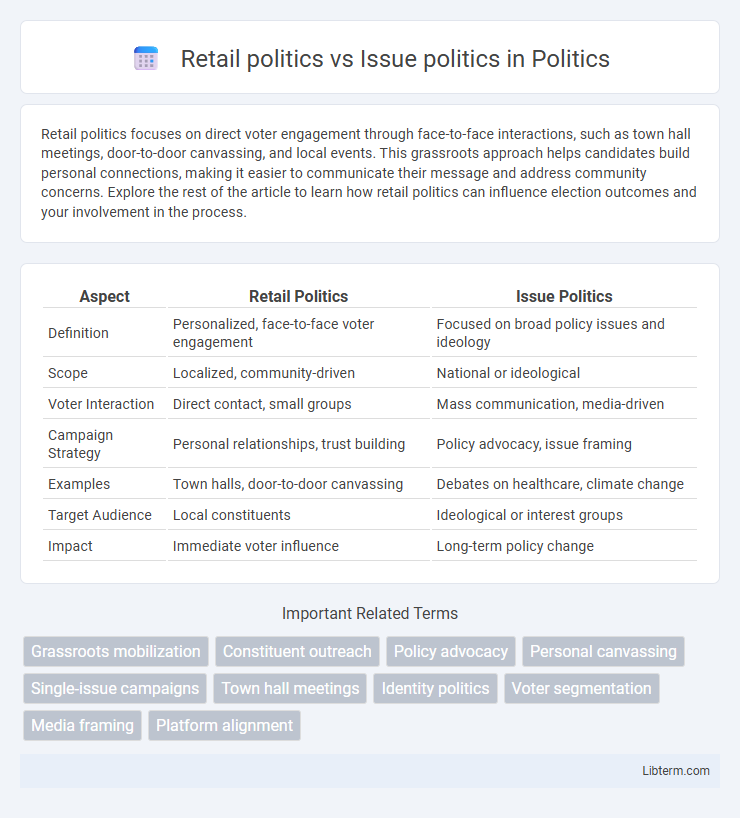Retail politics focuses on direct voter engagement through face-to-face interactions, such as town hall meetings, door-to-door canvassing, and local events. This grassroots approach helps candidates build personal connections, making it easier to communicate their message and address community concerns. Explore the rest of the article to learn how retail politics can influence election outcomes and your involvement in the process.
Table of Comparison
| Aspect | Retail Politics | Issue Politics |
|---|---|---|
| Definition | Personalized, face-to-face voter engagement | Focused on broad policy issues and ideology |
| Scope | Localized, community-driven | National or ideological |
| Voter Interaction | Direct contact, small groups | Mass communication, media-driven |
| Campaign Strategy | Personal relationships, trust building | Policy advocacy, issue framing |
| Examples | Town halls, door-to-door canvassing | Debates on healthcare, climate change |
| Target Audience | Local constituents | Ideological or interest groups |
| Impact | Immediate voter influence | Long-term policy change |
Understanding Retail Politics
Retail politics involves direct, personal engagement between politicians and voters, emphasizing face-to-face interactions like town halls and door-to-door canvassing to build trust and rapport. This approach thrives on localized, individual connections rather than broad policy discussions, contrasting with issue politics that centers on public debates and ideological stances. Understanding retail politics requires recognizing its impact on voter perception and electoral outcomes through personalized communication and grassroots mobilization.
Defining Issue Politics
Issue politics centers on public debates involving broad policy questions that affect large populations, emphasizing collective interests and ideological divisions. It contrasts with retail politics, which focuses on personal interactions between politicians and individual voters on localized concerns. Defining issue politics involves analyzing legislative agendas, public opinion on national issues, and advocacy group mobilization around topics such as healthcare, immigration, and climate change.
Key Differences Between Retail and Issue Politics
Retail politics involves direct, personal interactions between candidates and voters, such as town halls and meet-and-greets, emphasizing individualized voter engagement. Issue politics centers around broad policy discussions and mass communication strategies aimed at addressing specific political issues or ideologies. The key differences lie in scale and personalization: retail politics targets small groups or individuals, fostering trust and immediate feedback, while issue politics focuses on shaping public opinion through media campaigns and policy debates.
Historical Evolution of Political Campaigning
Retail politics, characterized by direct, personal voter engagement, dominated early political campaigning with candidates participating in town halls and door-to-door visits to secure trust and support. Issue politics emerged as campaigns shifted focus to specific policy debates and ideological stances, fueled by media advancements and the rise of political parties in the 19th and 20th centuries. The evolution reflects a transition from personalized interactions to mass communication strategies emphasizing policy platforms and voter mobilization.
Advantages of Retail Politics
Retail politics offer significant advantages by fostering direct, personal interactions between candidates and voters, enhancing trust and voter engagement. This approach allows politicians to tailor their messages to specific community concerns, resulting in more responsive and relatable campaigning. The intimate nature of retail politics can increase voter turnout and build stronger grassroots support than broader issue-based strategies.
Benefits of Issue-Based Campaigning
Issue-based campaigning drives voter engagement by addressing specific policies that resonate with constituents, resulting in higher turnout and informed decision-making. It fosters transparency and accountability as candidates clarify their positions on key topics like healthcare, education, and climate change. This approach encourages meaningful debate and long-term solutions, benefiting democratic processes and public trust.
Retail Politics in the Digital Age
Retail politics in the digital age leverages social media platforms, targeted advertisements, and data analytics to engage voters on a personal level, replicating face-to-face interaction online. Digital tools enable candidates to micro-target specific demographics with tailored messages, enhancing voter outreach and responsiveness. This evolution enhances the traditional retail politics approach by combining direct voter contact with scalable technology-driven strategies.
How Issue Politics Shapes Voter Behavior
Issue politics concentrates on specific policy concerns like healthcare, immigration, and climate change, directly influencing voter behavior by aligning electoral choices with personal values and priorities. Voters evaluate candidates based on their stance on salient issues, which often drives voter turnout and campaign engagement. Empirical studies reveal that issue salience strongly predicts voting patterns, demonstrating that issue politics shapes political identities and electoral outcomes more profoundly than retail politics.
Notable Examples: Retail vs Issue Politics
Notable examples of retail politics include Barack Obama's 2008 presidential campaign, where small, face-to-face events and town halls built strong voter connections. In contrast, issue politics is exemplified by Bernie Sanders' focus on comprehensive policy discussions like healthcare reform and economic inequality, emphasizing ideological commitment over personal interaction. Both approaches shape political engagement, with retail politics enhancing voter intimacy and issue politics driving focused policy debates.
The Future of Political Campaign Strategies
Retail politics emphasize direct, personal voter engagement through town halls, door-to-door canvassing, and intimate events, while issue politics prioritize broad communication of policy positions via mass media and digital platforms. The future of political campaign strategies integrates data analytics and micro-targeting to tailor messages that blend personalized voter interaction with issue-driven appeals, enhancing both engagement and persuasion. Advances in artificial intelligence and social media algorithms enable campaigns to dynamically adapt tactics, optimizing outreach for diverse electorate segments.
Retail politics Infographic

 libterm.com
libterm.com